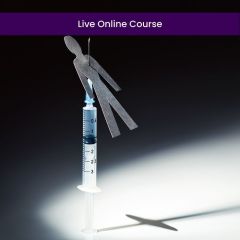Group Cognitive-Behavioral Therapy and Patients at Risk for Bipolar Disorder (1 CE)
Number of Credits: 1
This course is for: Clinical Psychologists and Counselors
Course By: Ken Springer, PhD
Content By: Leopold, K., Bauer, M., Bechdolf, A., Correll, C. U., Holtmann, H., Juckel, G., Lambert, M., Meyer, T. D., Pfeiffer, S., Kittel-Schneider, S., Reif, A., Stamm, T. J., Rottmann-Wolf, M., Mathiebe, J., Kellmann, E. L., Ritter, P., Krüger-Özgürdal, S., Karow, A., Sondergeld, L., Roessner, V., Sauer, C., & Pfennig, A. (2020). Efficacy of cognitive-behavioral group therapy in patients at risk for serious mental illness presenting with subthreshold bipolar symptoms: Results from a prespecified interim analysis of a multicenter, randomized, controlled study. Bipolar Disorders, 22, 517-529.
https://doi.org/10.1111/bdi.12894
Course Description: Studies have shown that cognitive behavior therapy (CBT) is an effective intervention for bipolar disorder (BD), but no controlled studies have examined the efficacy of CBT with young people at risk for developing BD. In the present study, participants ages 15-30 with subthreshold bipolar symptoms were randomly assigned to 14 weeks of either group CBT or unstructured group meetings. The researchers found that participants in both groups showed improvement in affective symptoms and psychological functioning, with no significant differences between groups. Although CBT was not particularly beneficial for participants, the results indicate that group sessions can strengthen the affective and psychological well-being of individuals at risk of developing BD.
Learning Objectives:
- Understand the rationale for the study as well as the methods used to provide therapy and gather data
- Describe the main findings of the study concerning the effectiveness of group CBT
- Integrate the strengths and limitations of the study, and summarize the clinical implications for supporting individuals at risk of developing BD
Course Outline:
- Read and understand Efficacy of cognitive-behavioral group therapy in patients at risk for serious mental illness presenting with subthreshold bipolar symptoms: Results from a prespecified interim analysis of a multicenter, randomized, controlled study
- Review the Course Description and Learning Objectives
- Understand the rationale for examining whether CBT could benefit individuals who exhibit subthreshold symptoms of BD
- Distinguish between the two therapeutic interventions provided to study participants
- Understand how affective symptoms and psychosocial functioning were measured before as well as after therapy
- Analyze the changes in affective and psychosocial well-being observed in each group following therapy
- Integrate the study's key findings, strengths, limitations, and clinical implications
- Work through the post-test questions, using the article as the sole basis for your answers
- Revisit the article for any missed questions and/or to better understand the benefits of group CBT for individuals at risk of developing BD
Approvals:
| Board Approvals | American Psychological Association (APA), NBCC, Florida Board - Social Work, MFT, Counseling, and Psychology, NYSED - Social Work, MFT and Counseling Only, American Academy of Health Care Providers in the Addictive Disorders |
|---|---|
| CE Format | Online, Text-Based |







